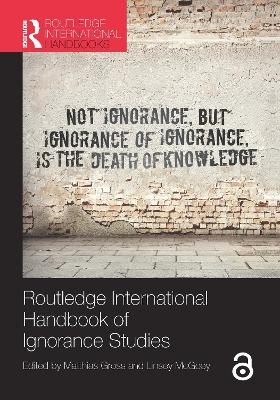
Routledge International Handbook of Ignorance Studies
Routledge (Verlag)
978-0-415-71896-7 (ISBN)
- Titel ist leider vergriffen;
keine Neuauflage - Artikel merken
Once treated as the absence of knowledge, ignorance today has become a highly influential topic in its own right, commanding growing attention across the natural and social sciences where a wide range of scholars have begun to explore the social life and political issues involved in the distribution and strategic use of not knowing. The field is growing fast and this handbook reflects this interdisciplinary field of study by drawing contributions from economics, sociology, history, philosophy, cultural studies, anthropology, feminist studies, and related fields in order to serve as a seminal guide to the political, legal and social uses of ignorance in social and political life.
Chapter 33 of this book is freely available as a downloadable Open Access PDF under a Creative Commons Attribution-Non Commercial-No Derivatives 4.0 license available here: https://tandfbis.s3-us-west-2.amazonaws.com/rt-files/docs/Open+Access+Chapters/9780415718967_oachapter33.pdf
Matthias Gross is full professor in the Institute of Sociology, University of Jena and, by joint appointment, at Helmholtz Centre for Environmental Research – UFZ, Leipzig, Germany. His research focusses on the sociology of energy, risk and ignorance, and experimental practices in science and society. His most recent monograph is Renewable Energies (with R. Mautz, 2014, Routledge). Linsey McGoey is Senior Lecturer in Sociology at the University of Essex. Recent articles appear in the British Journal of Sociology, History of the Human Sciences, and Economy and Society. She is editor of An Introduction to the Sociology of Ignorance: Essays on the Limits of Knowing (Routledge, 2014).
1. Introduction, Matthias Gross and Linsey McGoey Part 1: Historical Treatments of Ignorance in Philosophy, Literature and the Human Sciences 2. Ignorance and Investigation, Jens Haas and Katja Vogt 3. Learned Ignorance: The apophatic tradition of cultivating the virtue of unknowing, William Franke 4. Literary Ignorance, Andrew Bennett 5. Popper, Ignorance, and the Emptiness of Fallibilism, Shterna Friedman 6. From Descartes to Rumsfeld: The rise and decline of ignorance-of-ignorance, Jerome Ravetz 7. The Anatomy of Ignorance: Literature as a diagnostic tool, Richard Zeckhauser and Devjani Roy Part 2: Registering the Unknown: ignorance as methodology 8. The Production of Forbidden Knowledge, Joanna Kempner 9. Ignorance and the Epistemic Choreography of Method, Mike Michael 10. Sharing the Resources of Ignorance, Stuart Firestein 11. Expect the Unexpected: Experimental music, or the ignorance of sound design, Basile Zimmermann 12. Purveyors of Ignorance: Journalists as agents in the social construction of scientific ignorance, S. Holly Stocking and Lisa Holstein 13. Ignorance and the Brain: Are there distinct kinds of unknowns?, Michael Smithson and Helen Pushkarskaya 14. Linguistics and Ignorance, Nina Janich and Anne Simmerling 15. Undone Science and Social Movements: A review and typology, David Hess Part 3: Valuing and Managing the Unknown in Science, Technology and Medicine 16. Science— For better or worse, a source of ignorance as well as knowledge, Janet A. Kourany 17. Selective Ignorance in Environmental Research, Kevin Elliott 18. Lost in Space: Geographies of ignorance in science and technology studies, Scott Frickel and Abby Kinchy 19. Ignorance and Industry: Agrichemicals and Honey Bee Deaths, Daniel Lee Kleinman and Sainath Suryanarayanan 20. Doubt, Ignorance and Trust: On the unwarranted fears raised by the doubt-mongers’ pursuit, Albert Ogien 21. Decision-Making Under the Condition of Uncertainty and Non-Knowledge: The deliberative turn in genetic counselling, Alexander Bogner 22. Fighting a Losing Battle? The right not to know and the dynamics of biomedical knowledge production, Peter Wehling Part 4: Power and Ignorance: Oppression, emancipation, and shifting subjectivities 23. Global White Ignorance, Charles Mills 24. Intersubjective Vulnerability, Ignorance, and Sexual Violence, Erinn Cunniff 25. Vulnerability, Ignorance and the Experience of Radical Surprises, Christian Kuhlicke 26. Anthropological Perspectives on Ritual and Religious Ignorance, Liana Chua 27. Criminal Ignorance, Darren Thiel 28. Targeting Ignorance To Change Behaviour, Deborah Prentice 29. Rational Ignorance, Ilya Somin 30. Democracy and Practices of Ignorance, Lev Marder Part 5: Ignorance in Economic Theory, Risk Management, and Security Studies 31. The Production and the Function of the Under-Reporting of Farm-Workers' Pesticide Poisoning in French and Californian Regulations, François Dedieu, Jean-Noël Jouzel, Giovanni Prete 32. To Know or Not to Know? A note on ignorance as a rhetorical resource in geoengineering debates, Steve Rayner 33. Unfolding the Map: Making knowledge and ignorance mobilization dynamics visible in science evaluation and policymaking, Joanne Gaudet 34. Ignorance is Strength?: Intelligence, security and national secrets, Brian Rappert and Brian Balmer 35. Ignorance and the Sociology of Economics, Oliver Kessler 36. Decision-theoretic Approaches to Non-Knowledge in Economics, Ekaterina Svetlova and Henk Van Elst 37. Organizational Ignorance, Joanne Roberts 38. Managing with Ignorance: The new ideal, Allison Stewart 39. Taking it Personally: Medical ignorance, Ann Kerwin 40. Afterword Ignorance Studies: Interdisciplinary, multidisciplinary, and transdisciplinary, Michael Smithson
| Erscheint lt. Verlag | 26.5.2015 |
|---|---|
| Reihe/Serie | Routledge International Handbooks |
| Verlagsort | London |
| Sprache | englisch |
| Maße | 174 x 246 mm |
| Gewicht | 884 g |
| Themenwelt | Geisteswissenschaften ► Philosophie ► Erkenntnistheorie / Wissenschaftstheorie |
| Geisteswissenschaften ► Psychologie ► Allgemeine Psychologie | |
| Sozialwissenschaften ► Soziologie | |
| ISBN-10 | 0-415-71896-1 / 0415718961 |
| ISBN-13 | 978-0-415-71896-7 / 9780415718967 |
| Zustand | Neuware |
| Haben Sie eine Frage zum Produkt? |
aus dem Bereich


![Was heißt Denken?. Vorlesung Wintersemester 1951/52. [Was bedeutet das alles?] - Martin Heidegger](/media/113619842)